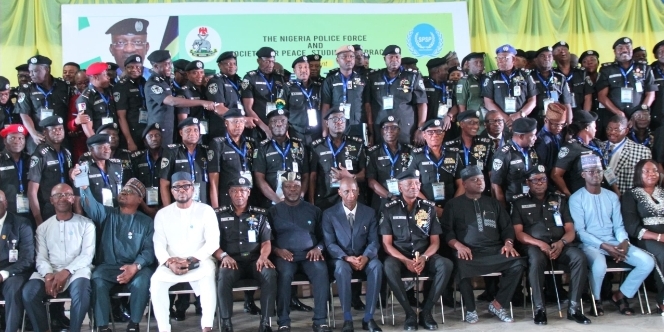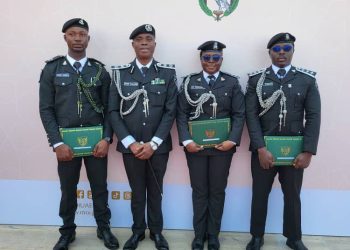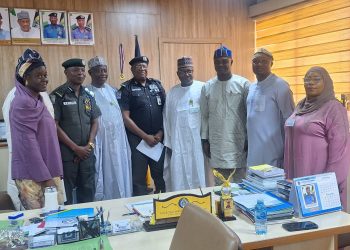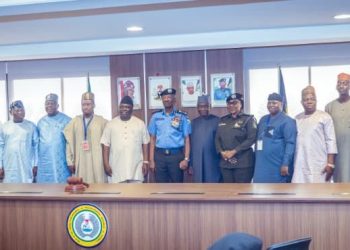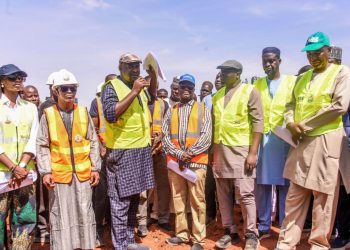By Nkechi Eze
The Inspector-General of Police, IGP Kayode Adeolu Egbetokun, Ph.D., NPM, has charged senior police officers to embrace a culture of accountability, ethical leadership, and proactive strategy in tackling Nigeria’s complex security challenges, declaring that the credibility of the Nigeria Police Force will be judged not merely by arrests made but by the institutional standards it enforces and the confidence it restores in the public.
Speaking at the Strategic Police Officers’ Conference held at the Goodluck Ebele Jonathan Peacekeeping Hall on Tuesday, 23rd September 2025, the Police Chief described the gathering as a “call to leadership” rather than a ceremonial meeting. “This is not a routine meeting to merely tick boxes. It is a call to leadership, an audit of our performance, a stocktaking of our direction, and a moment of deliberate recalibration,” he declared.
He reminded the senior officers that the Force was constantly under scrutiny and must not be found wanting. “The nation looks to this room not for promises or applause but for vision, strategy, and execution. What ultimately defines our tenure is not the number of suspects we parade, but the institutional culture we shape, the standards we enforce, and the confidence we restore in the uniform we wear,” he said.
The IGP noted progress since the last conference in July, citing improved command posture, tactical responses, and supervisory presence in the field, but warned against selective compliance. “Excellence cannot thrive where compliance is selective,” he cautioned. “Some Commands are still short of full adherence, and that must change if we are to move as one Force.”
Egbetokun painted a sober picture of Nigeria’s current policing environment, describing it as a period of “intense complexity.” According to him, “Threats are no longer localised or predictable. We are confronting hybrid criminal actors who blend physical violence with cyber tactics, local knowledge with transnational reach, and petty motives with ideological ones.”
Despite these challenges, the IGP said the Police had shown agility and results, disclosing that between 31st July and 23rd September, 4,383 suspects were arrested nationwide for serious crimes, including 481 armed robbery suspects, 260 kidnappers, 371 murder or culpable homicide suspects, and 161 for unlawful possession of firearms. Others included 322 suspected rapists, 375 cultists, and 2,413 for other crimes. Within the same period, the Police recovered 716 assorted firearms, 21,238 rounds of ammunition, 212 vehicles, and rescued 1,138 kidnapped victims.
“Each of these figures represents more than enforcement metrics; they reflect lives saved, families reunited, and communities restored to peace,” Egbetokun said. “Behind every number is an officer who faced danger, took a calculated risk, and displayed courage beyond measure.”
He highlighted key operations across the country, including the dismantling of IPOB/ESN strongholds in the South-East, the neutralisation of kidnapping syndicates in Oyo, Ogun and Itesiwaju, and the rescue of 16 kidnapped victims in Edo State in September. He further recalled the arrest of 333 electoral offenders during the August by-elections in Kano, stressing that operational successes must always be followed by accountability. “Far too many Commands delay or underreport major breakthroughs, weakening the Force’s ability to build national narratives of success and shape public confidence. Victories must be captured, verified, and communicated,” he insisted.
On abuse of police authority in civil disputes, particularly land matters, the IGP was unequivocal: “The Nigeria Police Force is not, and will never become, an enforcer for private interests. Officers have no business escorting parties for land recovery, disrupting legally existing occupations, or meddling in civil claims without a demonstrable criminal element. Every such incident erodes the Force’s neutrality and opens us up to disrepute. The line must be clear. And any officer who crosses it will face disciplinary consequences.”
With the year’s last quarter approaching, traditionally marked by spikes in violent crimes, the IGP directed Zonal AIGs to activate multi-layered visibility policing, ordered Commissioners of Police to extend surveillance beyond urban centers, tasked tactical teams with highway and forest corridor patrols, and called for intensified but sincere community engagement. “Let every Command return from this conference with an operational calendar for October to December. I expect to review these frameworks personally,” he ordered.
Egbetokun told senior officers that their decisions and conduct directly shape the institution’s culture. “Your tone becomes the culture of your Commands. If you cut corners, so will your officers. If you uphold ethics, so will they. If you dismiss misconduct, impunity will multiply,” he charged.
As the conference drew to a close, the Police Chief issued a parting challenge: “Let this not be one more meeting we forget after the applause fades. Take every insight gained here as a mandate. Let your next decision prove that you understood the charge of leadership. Let your next action reaffirm the public’s trust. Let your next report reflect vision, not just compliance. We owe our officers in the field clarity. We owe our citizens protection. We owe our badge integrity. Above all, we owe this nation a Police Force that does not falter – even when others do.”


